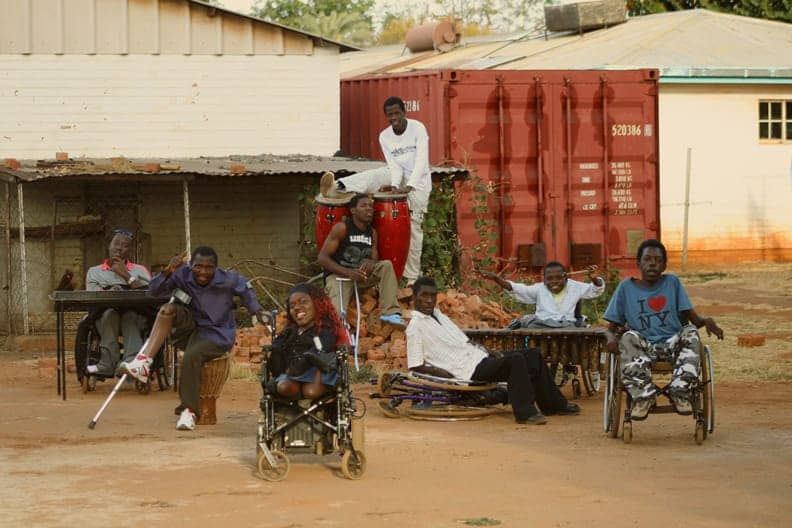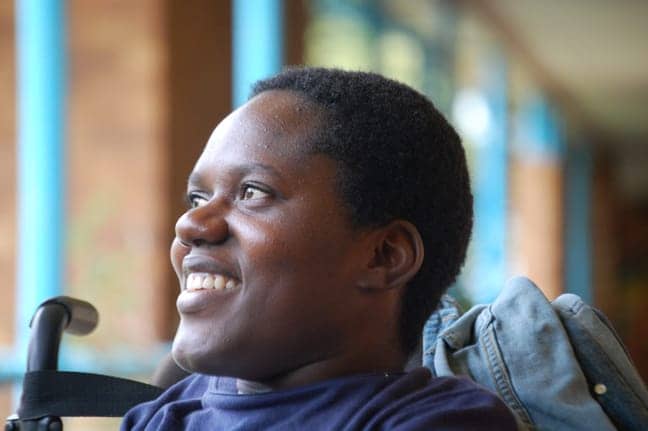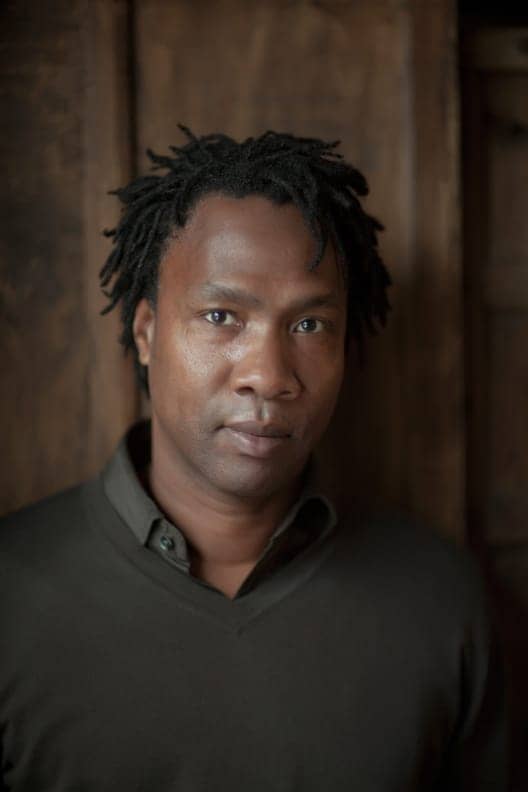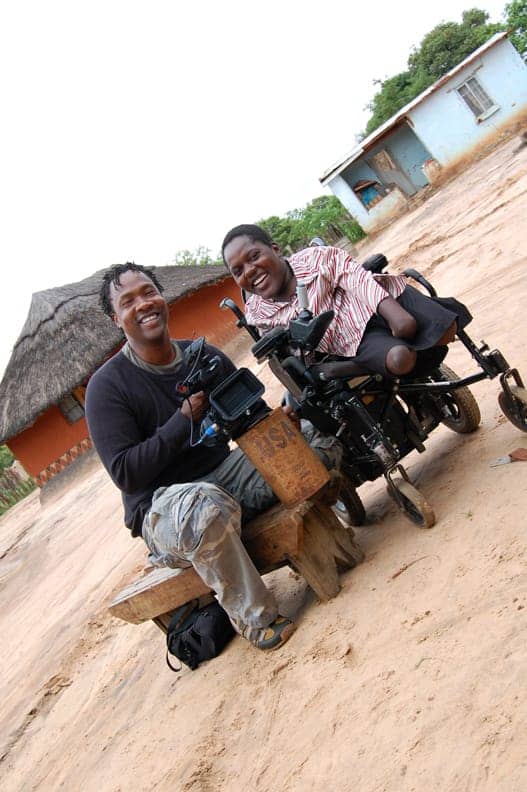
In Zimbabwe, disabled babies are commonly believed to be the result of witchcraft. In extreme cases, families kill them – to remove the “curse” from their family.
Born in the idyllic town of Victoria Falls, one of the seven natural wonders of the world, Prudence Mabhena had a different fate. Her parents, a handsome tour guide and the village beauty, had been picture-perfect newlyweds. When Prudence was born, it was clear something wasn’t right. Her arms and legs were severely twisted, stunted and useless.
Prudence’s paternal grandmother directed her daughter-in-law to refrain from breastfeeding, i.e., kill the baby. Prudence’s mother disobeyed and was ostracized and cast out. She brought Prudence to her mother’s rural home and, when Prudence turned 4, left her to her grandmother’s care.
In Zimbabwe, treatment of the disabled sinks beneath discrimination. Not only is there a void of protective legislation – no Africans with Disabilities Act – and disabled-friendly infrastructure, such as elevators and ramps, disabled people are given a wide berth and treated as if contagious. If permitted to live, the disabled are often left to die.
In Bulawayo, Zimbabwe’s second largest city, there is a place that transcends this: King George VI School and Centre for Children with Physical Disabilities (KG6). Privately funded, KG6 struggles on the brink of destitution. Yet, hundreds of children blossom under the care of director Inez Hussey. Prudence lives there now, and she teaches. But first, she had to pass through hell.
A working farmer, Prudence’s grandmother couldn’t school the little girl. So she went to KG6. But soon, Prudence’s father lost his ability to pay the tuition. Prudence is forced to move in with her father. By now, her legs – useless and twisted – have been amputated.
Prudence’s father is remarried with kids. He and his new wife – Prudence’s stepmother* – refuse to care for her, even to touch her. For two years, Prudence lives like an animal. Without someone to take her to the bathroom, she sits in her own urine and feces. Without a wheelchair, she can only crawl, and she eats from the floor – when fed. Every day, Prudence drags herself to the mango tree in the backyard, sings and tells herself that her nightmare will end soon.
Finally, Prudence is awarded a scholarship to KG6.
A new life … and LiyanaAt age 9, Prudence arrives at KG6 dehumanized and untrusting. She receives a wheelchair donated by a charitable Swede. She cleans up, goes to school and becomes “human” again. Happy, she begins singing in earnest.
Prudence’s voice is so resonant and beautiful that the school administrators suggest she try out for the school choir. Within a week, she’s not only a member of the choir, she’s leading it. She has bloomed at the school and she’s thriving. She also joins Inkonjane, an a capella group. Through the group she has the opportunity to sing in Switzerland.
Back in Zimbabwe, Prudence and some fellow students and musicians start an Afro-fusion band called Liyana (“it’s raining” in Ndebele). All eight of its members are disabled. Marvelous Mbulo has muscular dystrophy. Farai Mabhande shares Prudence’s disorder and plays the keyboard with twisted fingers. Prudence, the band’s only woman, cannot hold a microphone, so it’s mounted to a metal stand that reaches under her chin. With just a head, torso, and tiny arms, Prudence weighs no more than 50 lbs. But the sound that pours out of her is rich enough to fill a stadium, and it is haunting.
In 2006, the struggling school scrapes together the money to send Liyana to compete in Music Crossroads, an all-Africa competition being held in Mozambique. The journey to Mozambique is long and arduous. They get there just in time to compete and come in second. The prize? A tour of Sweden. The band performs and gains a name. Arrest, prison, blackouts and hungerFrom the outset, this was a special film. The film would never have come to fruition without unusual courage on the part of the crew. Director Roger Ross Williams and his crew shot “Music by Prudence” over the course of several months and several trips to Zimbabwe. In doing so, they risked arrest, imprisonment, torture, deportation and potentially worse.
Journalism is officially illegal in Zimbabwe. But as evidenced by the 2008 imprisonment of New York Times journalist Barry Bearak, factual journalism can land its proponents in prison.
The principal portion of the shoot for “Music by Prudence” took place against this violent, anti-journalistic backdrop. President Robert Mugabe, Zimbabwe’s longtime dictator, had not received a majority vote in the country’s 2008 presidential election. In the lead-up to the runoff, the leading party unleashed horrifying violence against opposition supporters, and they pulled out. The “Music by Prudence” crew was subject to intense scrutiny.
“Every night, we didn’t know whether we’d be raided and jailed or deported. [The authorities] knew who we were. Zimbabwe’s central intelligence agency was keeping tabs on us. They’d go to my stringer’s house and say, ‘Make sure they don’t shoot anything having to do with the election,’” said Williams.
On top of the stealth, Bulawayo, like the rest of the country, suffered from drastic shortages. Water stoppages and electrical blackouts are common, day-to-day worries. Even food is in short supply: With none in the supermarkets, one has to buy it on the black market. Inflation is so high that during the course of the shoot, Zimbabwe currency became worthless.
During most of the shoot, the crew lived in a wealthy low-density suburban community. But even that community was not immune to lack of water and power and rampant theft. There’d been a wave of armed robberies, which put everyone on edge.
Narrated by Prudence“Music by Prudence” is about a resilient young woman. Cleverly, the story is also told by her – in a gentle and matter-of-fact tone. A compelling character, the 21-year-old (then 19-20) has a lovely face and a surprisingly playful manner and speaks in a soft voice with a British lilt. She is charismatic, engaging, strong and confident and the camera loves her. Gone is the shell of a girl that arrived at KG6.
Prudence now teaches music at the school. She collects a salary, room and board – which makes her one of Zimbabwe’s rare employed citizens. Surprisingly, she also choreographs dances from her wheelchair and teaches dance to the deaf.
Typically, people with her disability do not live long. But so far, Prudence has been healthy and hopes for a thriving career. Prudence finds strength in her adopted family: the members of her band. Having been similarly rejected by their families and their culture, they all share a similar trauma.
Eventually, Williams plans to release a director’s cut containing extra footage. He’s optimistic that the Oscar nomination for “Music by Prudence” will raise awareness for KG6 and increase donations. Tax-deductible donations can be made through MusicbyPrudence.com.
*In a great irony, Prudence’s stepmother suffered a stroke and is now paralyzed. She uses Prudence’s former wheelchair.
Synopsis of ‘Music by Prudence’Sunrise over the bush. A fresh morning star spilling vitality over scrambling, dry rocks.
The African plain: supple and green. Clouds – celestial rapids – racing over an otherwise halcyon sky.
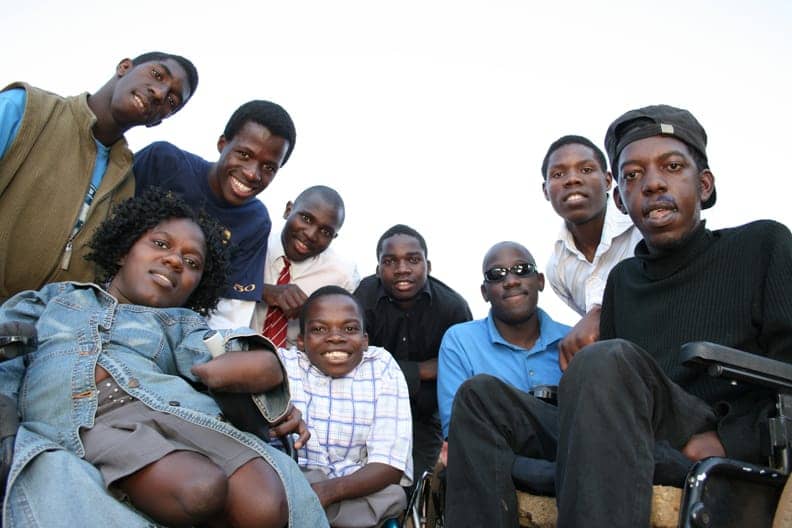
Her voice is stirring, but also still, in contrast to the rushing sky. It’s the voice of a leader, someone in a place of power and wisdom and uncommon peace. Then into the picture rolls its owner: a young African woman in a wheelchair. Her arms are twisted and useless. Without legs, she has never walked. The source of this commanding, compelling music is a head and a torso, and not much more.
Meet Prudence Mabhena, 21, the hero of our tale.
Prudence lives in Zimbabwe, and for a long time almost no one knew about that hauntingly beautiful voice. No one knew the strong, resilient woman who owned it. They were unable to overlook her body: crippled and deformed with a debilitating condition called arthrogryphosis.
When Prudence was born, her paternal grandmother wanted her dead. In Zimbabwe, disabled children are believed to be the result of witchcraft. In extreme cases, families kill them – to remove the “curse” from their family.
Prudence’s mother kept her and fed her. Cast out of her husband’s (Prudence’s father’s) home, she brought the baby to her own mother’s rural home. Four years later, she left.
“Music by Prudence” traces the path of this little girl, and her remarkable transcendence from a world of hatred and superstition into one of music, love and possibility.
The child was raised by Rachel Ncube, her maternal grandmother. Grandmother Ncube taught her to sing. A working farmer, she would strap the little girl to her back as she worked the fields. But when Prudence turned 7, she knew she couldn’t school her. So she sent her to live with her father and his new family.
There, Prudence fell prey to neglect and isolation. Her stepmother refused to touch her and called her a worthless, helpless “ant.” She was despondent enough to attempt suicide – twice.
There is a haven away from this pain: King George VI School and Centre for Children with Physical Disabilities (KG6). Privately funded, KG6 struggles on the brink of destitution. Yet every year, hundreds of disabled children blossom and thrive.
Prudence gets a scholarship to KG6, and her new life begins.
Bulawayo provides the film’s colorful backdrop. Like the rest of the country, Zimbabwe’s second largest city is largely dysfunctional. Water stoppages and electrical blackouts are daily events. The supermarkets have no food, so residents are forced to use the black market for necessities. Inflation and crime run rampant.
The movie’s final scene is a concert by Liyana. The crowd applauds and whistles, then the screen darkens, leaving only Prudence’s lustrous, smiling face. Recalling the opening sequence, her face is in perfect symmetry to the African sky, rushing and streaming towards hope. Roger Ross Williams, director-producerRoger Ross Williams is a member of a Gullah family from South Carolina. He is a working television news, documentary and entertainment producer, director and writer who has lived and worked in New York City for the past 25 years. As a television news and documentary director and producer he has worked for ABC News, NBC News, MSNBC, BBC, CNN and PBS.
Williams has produced entertainment shows for ABC, CBS, Comedy Central, Food Network, Sundance Channel, TLC, VH1 and Michael Moore’s Emmy Award winning series TV Nation. He has directed prime-time reality shows for ABC and CBS and produced a documentary series for Discovery Networks and a lifestyle series for Scripts Networks. He has won numerous awards including a NAMIC Vision Award for his television special “Moroccan Style” and the National Headliner for Best Human Interest Feature for his documentary “New York Underground.”
Of “Music by Prudence,” he says: “You quickly forget [Prudence is] disabled because she’s such an amazing, dynamic person. … charismatic and brilliant and engaging. …
“Because I’m African-American, … it gave me an intimacy with the subjects … and there’s a certain connection that gets made. … There’s [still] a divide because I’m African-American and they’re African. …
“My everyday cinematographer [Errol Webber] was a young Jamaican kid who had just graduated from film school. It was important that I have an African-American cameraman who was young. [The band members] saw him as their peer. Most of the time, it was just me and Erroll.
“Africa’s a beautiful place. Africans are such beautiful people and so close to the earth. Where Prudence comes from — near Victoria Falls — is breathtaking.
“I spent a lot of time [at Prudence’s grandmother’s rural home], sleeping in a hut. There’s no water. There’s no electricity. I had literally gone back to my roots. I loved every minute of being there — sitting by the fire, singing songs. It was a spiritually enlightening experience. It was easy to capture that.
“My ancestors were slaves imported from the western lowland coast of Africa to the lowlands of the Carolinas. They were rice cultivators, which is why they were imported to America: to cultivate rice before cotton took over. Malaria hit, but they were immune, and survived to settle.“I had to gain [Prudence’s] trust. Because of what Prudence has been through, it takes time for her to trust people.
“I talked to her, treated her with respect as a person and an artist. I was honest with her about the filmmaking process. I explained that she would need to open up.
“[She talked about her suicide attempts] during our first interview. She’d never told anyone before. She cried and I cried.
“The process of being interviewed: you become self-reflective; it’s like being in therapy. She couldn’t wait to tell her story. Nobody had ever heard her story before — or asked.
“Afterwards, I went to the place where I was staying. I cried and cried and cried. I was just devastated. I was so moved by her strength — her ability to get beyond the moment when she was at her lowest. I was determined to get her story out there and tell it to the world.
“She finds strength in the members of her band, such as her friend Marvelous. They’re all in it together. They’re a family. They understand each other; they’ve all been through the same trauma. They’ve all been rejected by their families and their cultures. They’ve persevered. Together they find strength.
“Prudence has this unique ability to laugh and still find joy around her. She’s this positive and joyful person. She has this inner strength and an innate, inner light. She’s funny and edgy, and she makes fun of herself. …
“She wants to have a career in music. She wants to leave Zimbabwe and come to America and have a career as a working musician. That’s her dream. I think things like an Academy Award nomination — a win — would help her realize her dream. She’s such a talent and the world needs to see. She can have a career. There’s a circuit of world musicians that perform. She could be part of that community. It could change her life.
“I shot hundreds and hundreds of hours of footage. So much it was ridiculous. A lot of it is concert footage shot on multiple cameras.
“There’s a wealth of material that I plan to release in the director’s cut. There were a lot of scenes that we had to edit out because of the constraints of making a short. Buy the DVD, people!” Look for it in fall 2010 or later, at www.musicbyprudence.com.
After the film was finished, Prudence told Roger, “I want you to win an Oscar!” When they were nominated, he called Prudence, who was shocked and overwhelmed. “It’s unimaginable,” he said, “that a girl left in a hut to die is now celebrated in the world for her talent. I hope everyone gets to see this movie and to see her and know her the way that I do.”



